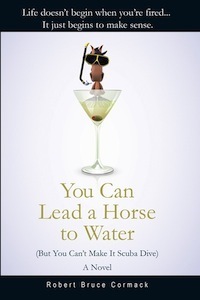Dreams Can Make You Rich. Dreaming Can't.

On Shark Tank not long ago, a man was asked why he decided to devote his life to making a better potting moss. “At the age of fifty,” he said, “I told myself, If you don’t do this now, you’re never going to do it.”
I could see all the fifty-year-old viewers saying to themselves: “Man, he’s right. If I don’t follow my dreams now, I’m never going to do it, either.”
I’m sure lots of them turned off their television sets and started thinking: “Now, what’s a good dream? What dream do I have that would make me scads of money? Hey, isn’t there a dream app or something?”
After about fifteen minutes, they’re back watching Shark Tank again.
If they’d kept watching, they would have heard the other part of the man’s story. Like the fact that he started his first greenhouse when he was twelve years old. Or that he worked in a similar industry for most of his career. Or that his concept came about through years of thought and research.
In other words, that dream was a long time coming.
It’s one thing for people like Richard Branson to talk about following your dreams. It’s another to understand the difference between dreams and dreaming. One is a product of thought, the other is a product of fantasy.
As a fantasy, dreaming isn’t going to make you rich. All it does is paint a picture, a rosy one, no doubt, but it’s still nothing more than a painting (paintings sell for about two hundred dollars these days—and they’re pretty good ones!)
If you’re saying now: “So, you’re telling me I need a business plan, a funky product name, a website, followers on social media, that sort of thing?”
No, that’s not what I’m saying at all. I’m saying that a dream has to be a construct. It has to be built from a foundation of experience. You can’t just pick dreams out of the air, although you get that impression watching Shark Tank.
We all hear about kids developing apps that go on to make millions of dollars. As easy as it sounds, those kids are few and far between. Of all the apps created, less than one percent are successful?
So it ain’t that easy following your dreams. Even the Bransons of the world spent years building upon small successes and plenty of failures.
I’m not trying to discourage you. Just keep one thing in mind: You don’t build a dream over night and expect it to pay off in the morning.
A friend of mine and I were talking the other evening. She’s been thinking about developing a business around personal empowerment. As an insurance mediator, she has lots of experience. “So how do I segue into this new career?” she asked me. “Do I give up my job? Can I do both?”
I said to her: “As long as you have a direction, it isn’t a question of stopping one and starting the other. Sometimes the direction plans itself.”
I know that sounds a bit ethereal. Let me explain what I mean.
Twenty years ago, I was writing short stories in my spare time. I had a job, a career. I said to myself: “I’ll just keep submitting short stories. It won’t pay me anything right now. But maybe, when I retire, I’ll have enough contacts with publications to at least supplement my income.”
So I wrote stories, submitted them, and finally got published. Not often, but I was learning. I knew what getting rejected felt like. I also knew what getting accepted felt like.
When I wrote my first novel (fifteen years later), I had the fundamentals in place. I’d written millions of words, and sent out hundreds of query letters.
One day I got my manuscript accepted. It would be another five years and many rewrites before it was actually published. Even then, I still had to learn about book titles, cover design, markets, business plans, copyrights, contracts and, above all, promotion.
Holding that first author’s copy in my hand was a great experience. But it would take months just to get noticed. My ranking on amazon started at 4,837,399. After a lot of promotion, I managed to raise my ranking to 135,023 (don’t laugh, John Grisham’s latest novel is ranked at 17,209).
I should add—as I did with my friend—all of this was happening while I continued my freelance business. It never occurred to me to choose one over the other. I needed both, and that took many, many hours.
So following your bliss ain’t so blissful. Dreams are hard fought and require a lot of patience. As I told my friend: “You have to want a dream bad enough. It will consume you. You’ll never stop learning. And you’ll never stop worrying.”
I suppose I could go on Shark Tank tomorrow and talk about how, when I was fifty, I said: “If I don’t do this now, I’ll never do it.” I could also throw in a bunch of stuff like sales, market penetration, all the things that separate dream builders from dreamers.
That’s the difference, though. A dream builder knows when to stop dreaming.
Did you know that Anthony Burgess, author of Clockwork Orange, didn’t write his classic until he was in his late fifties? Before that, he’d been a teacher in the Colonial Service. While in Brunei, he was diagnosed with an inoperable brain tumor. He started writing books to leave his widow an income. On his return to England, he discovered the tumor was nonexistent.
Circumstances often force us into pursuing our dreams. Sometimes it’s health, sometimes it’s simply being fired. We need money, so we look to our dreams.
Necessity is the mother of invention. It’s also the mother of fantasy. Don’t mistake one for the other. Dreaming isn’t going to make you rich. If you’re still having trouble distinguishing dreams from dreaming, this should help:
“I’m dreaming of a white Christmas” means you’re hoping the weather changes, clouds appear, then big white snowflakes fall.
“My dream is to put snow on that mountain” You invest in a snow-making machine.
What about you? Are you making a dream happen or still dreaming? Let me know at: rcormack@rogers.com
Robert Cormack is a freelance copywriter, novelist and blogger. His first novel “You Can Lead a Horse to Water (But You Can’t Make It Scuba Dive)” is available online and at most major bookstores. For more details, go to Yucca Publishing or Skyhorse Publishing.

Articles from Robert Cormack
View blog
This is the latest issue of Rosebud Magazine (#69), marking my twenty-year relationship with publish ...

This could (and should) change your writing entirely. · “It’s better to fail at originality than suc ...

It's a dog's life. Even dogs know that. · “If it wasn’t for received ideas, the publishing industry ...
You may be interested in these jobs
-
Channel Manager
Found in: beBee S2 CA - 2 weeks ago
Arrow Electronics Remote, NB EA A, Canada OTHERPosition: · Channel Manager - IBM RedHatJob Description: · Are you passionate about growing channel partnerships? · Arrow is looking for a Channel Manager who will grow our IBM RedHat business with new and existing partners within the Enterprise Computing Solution (ECS) group of ...
-
registered early childhood educator
Found in: Talent CA 2 C2 - 3 days ago
YMCA of Eastern Ontario Kingston, CanadaEducation: · Expérience: · Education · College/CEGEP · Experience · Experience an asset · Health benefits · Dental plan · Disability benefits · Health care plan · Paramedical services coverage · Vision care benefits · Long term benefits · Maternity and parental benefits · Other ...
-
Non-Destructive Evaluation
Found in: Talent CA C2 - 3 days ago
Thermon Oakville, Canada Part timeWho We Are · Thermon Canada Inc. is a World leader in Process heating systems. We are currently experiencing rapid growth due to global expansion. · We design and manufacture heating and filtration systems for the Energy sector primarily Oil, Gas, Nuclear and process heating appl ...



Comments